The Ariake arm chair beautifully combines Japanese and Scandinavian esthetics: the slightly curved backrest, pole-like legs and a crossed support structure add a touch of Japanese harmony and softness to the otherwise simple form typical of Scandinavian furniture. The natural shades and different seat options make Ariake, designed by Gabriel Tan, suitable for any interior.
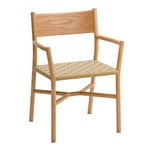
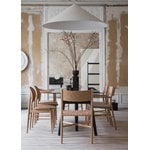

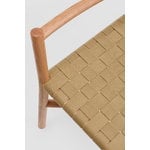
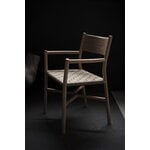
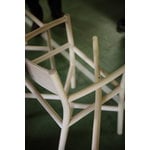
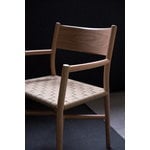
Ariake arm chair, oak - textile strap
Ariake
Description
The Ariake arm chair beautifully combines Japanese and Scandinavian esthetics: the slightly curved backrest, pole-like legs and a crossed support structure add a touch of Japanese harmony and softness to the otherwise simple form typical of Scandinavian furniture. The natural shades and different seat options make Ariake, designed by Gabriel Tan, suitable for any interior.
Product details (7)
- Colour
- Oak, natural
- Width
- 22.83 in (58 cm)
- Depth
- 20.28 in (51.5 cm)
- Height
- 32.48 in (82.5 cm)
- Seat height
- 17.72 in (45 cm)
- Frame material
- Tammi, mattalakkaus
- Seat material
- Textile strap: 100% acrylic
- Product ID
Designer
Gabriel Tan, born 1982, is a Singapore and New York based designer working across disciplines to find ways to combine tradition and technology, heritage and cosmopolitan esthetics. In addition to collaborating with brands like Menu and Wallpaper*, Tan has also worked as a creative director for Turn Handles, Origin and Ariake, and spoken as a guest lecturer at several institutions. The works of his design practice, Gabriel Tan Studio, have been exhibited all over the world.
View all productsReviews (0)
Sustainability
The Product Sustainability Framework, our criteria of sustainable design, helps you find the most sustainable products in our selection. Read below which sustainability criteria this product has met.
Working conditions & labour 8/9
-
Equal opportunities for all employees
-
Commitment to UN Global Compact, fair compensation for all employees
-
Corporate responsibility requirements defined and communicated for suppliers
-
Systematic work for improved inclusion and well-being in the workplace
-
Transparent supply chain
-
Suppliers' compliance to a code of conduct ensured
-
Compliance to the UN Guiding Principles on Business and Human Rights ensured in the supply chain
-
Support for community involvement in the supply chain
-
Direct suppliers audited and certified
Eco-friendly production 9/9
-
Fair and resource-wise water-use in production
-
No incineration or landfilling of returned items
-
No use of endangered species as materials
-
No direct environmental emissions or waste (excl. GHGs) from production
-
The sustainability of direct suppliers' production is addressed and monitored
-
Production and material sourcing that respect biodiversity, animal rights, and natural ecosystems
-
Material-efficient and ecological packaging
-
Positive impact on nature’s well-being through operations that regenerate natural ecosystems
-
No potentially harmful chemicals used in own production
Climate impact 4/8
-
Company's direct greenhouse gas emissions identified and commitment to reduction
-
Product's carbon impact identified and commitment to reduction
-
Guidance on energy- and eco-efficient use of the product
-
Contribution to climate initiatives beyond the brand’s direct operations
-
Low-carbon or compensated transportation
-
Carbon footprint of the product calculated and goals set to reduce it
-
100 % renewable energy in own production and operations
-
Carbon neutral or carbon negative product
Sustainable materials 5/6
-
Sustainable and long-lasting material choices
-
No harmful or hazardous substances
-
Responsible raw material sourcing and production
-
Materials suited for circularity: monomaterials, recyclable finishings, renewable or recycled contents etc.
-
Ecological materials: natural, biodegradable, recyclable or recycled contents
-
Outstanding materials in terms of innovativeness, responsibility, sustainability and circularity: local production or sourcing, 100 % recycled content, C2C-certification etc.
Circular design 4/5
-
High aesthetic quality promoting long-term use of the product
-
Technically durable product design and material choices
-
Design for enduring life-long quality
-
Design and support for product maintenance, repair and upgradability
-
Innovative circular design solutions: circular service system, resale platform, remanufacturing, collection of used products, etc.









